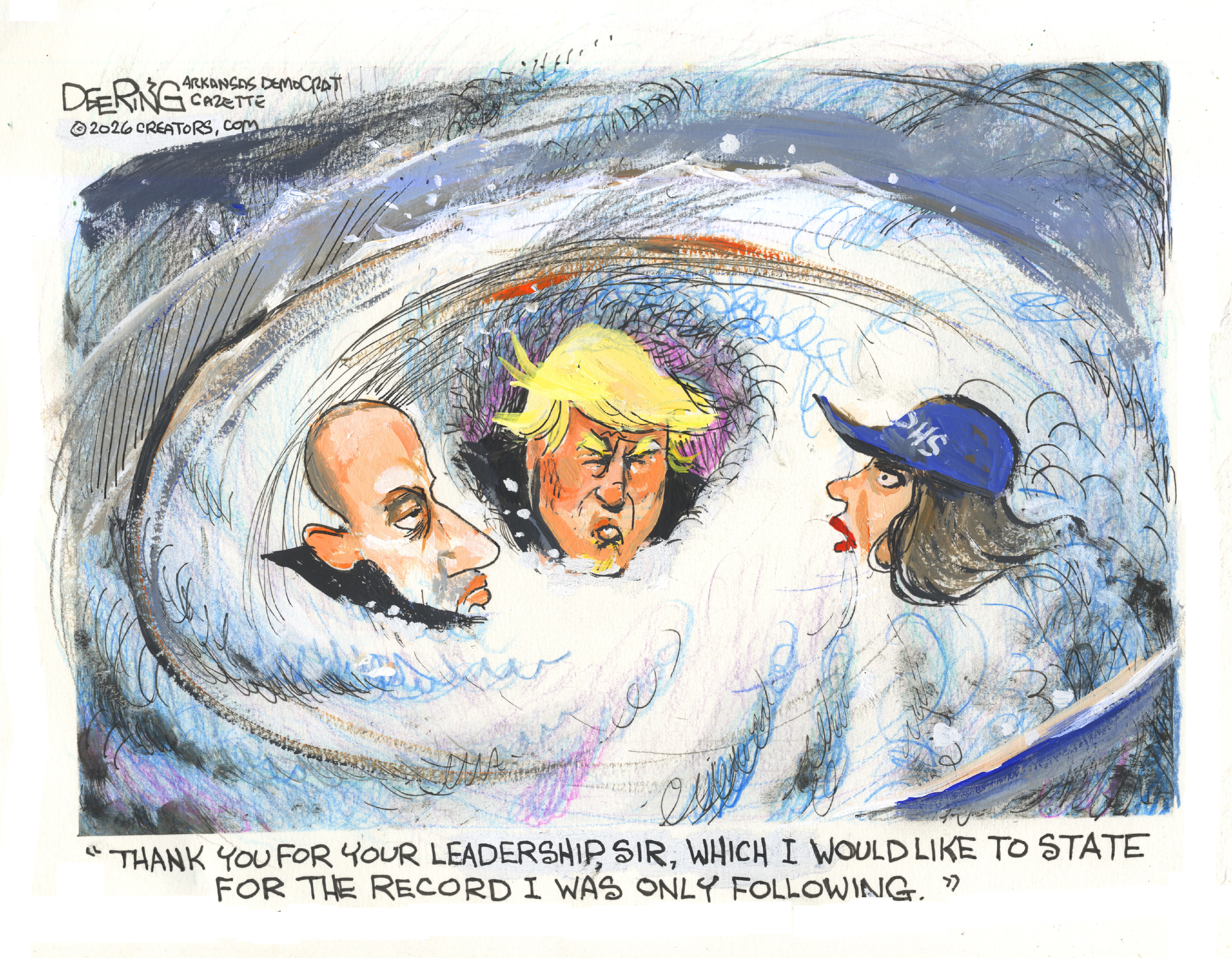How to deal with science deniers
What the overwhelming success of California's vaccination law means for the fight against climate change


A free daily email with the biggest news stories of the day – and the best features from TheWeek.com
You are now subscribed
Your newsletter sign-up was successful
How do you persuade climate deniers to believe in science? For the past several decades, as increasingly unhinged conspiracy theories have become inalterable Republican Party dogma, political scientists and activists have fretted about how to change their minds, and make the GOP like every other conservative party in the developed world. Various strategies in studies have not worked well at all.
But there is a different, appealingly simple solution to vaccine or climate denialism and other crank beliefs that create public policy emergencies: Just steamroll them with state power.
California provides an example of this, both in motivation and in execution. Only a couple years ago, it was a festering hotbed of vaccine-preventable diseases, because it had relatively lenient rules for avoiding vaccination for children and a bad case of vaccine denial, especially in certain communities. The result, as one might have predicted, was several outbreaks of measles — including a notorious one in Disneyland that gained national attention.
The Week
Escape your echo chamber. Get the facts behind the news, plus analysis from multiple perspectives.

Sign up for The Week's Free Newsletters
From our morning news briefing to a weekly Good News Newsletter, get the best of The Week delivered directly to your inbox.
From our morning news briefing to a weekly Good News Newsletter, get the best of The Week delivered directly to your inbox.
In response, California dramatically tightened up its vaccine rules. The major lever for enforcing vaccination is school attendance, and the state government ended all non-medical personal exemptions for children to attend public school. (Some people are allergic to vaccines — but that only increases the importance of everyone else getting their shots, so that people who can't be vaccinated can still be protected by herd immunity, which takes effect at around 95 percent vaccination.) As of mid-2015, every child without a doctor's note had to have their shots or be forbidden from attending school.
As The New York Times reports, the result was a tremendous increase in the vaccination rate:
Data from a county-by county analysis shows that in many schools with the lowest vaccination rates, there was an increase of 20 to 30 percentage points in the share of kindergartners vaccinated between 2014 and 2016. [New York Times]
Now, a cautionary note is in order. There ought to be a high bar for simply shoving people like this. In a free society, people ought to be able to live as they choose — so long as that is practicable for a similar freedom for everyone else.
California's vaccination law cleared that bar. While a sizable number of parents were simply coerced into getting shots, it was unquestionably worth doing. Vaccine denial is not some harmless nonsense, like flat Earth conspiracies or other silly ideas. Measles is a serious, extremely contagious disease that used to kill hundreds of thousands of people annually around the world. Whooping cough (another formerly rare disease that has made something of a comeback thanks to vaccine cranks) is horrifically unpleasant and can easily kill babies who catch it.
A free daily email with the biggest news stories of the day – and the best features from TheWeek.com
The case for California's policy was also much strengthened by the overwhelming scientific evidence that vaccines work well, with minimal side effects. The few anti-vaccine studies that have been produced turn out to be weak, poorly designed, and in the case of one notorious case study from Andrew Wakefield, actually fraudulent — prompting an official retraction and Wakefield being stripped of his medical license.
Climate policy is another area in which the views of deniers simply deserve no hearing whatsoever. Climate change is already causing large damage to world society, and we have very strong reason to think it will get much, much worse in the future. The scientific consensus is as strong as it could realistically be for future predictions about such a complicated system. The emission of greenhouse gases that cause climate change must be stamped out as fast as possible.
Luckily for President Trump and virtually every other Republican, climate policy doesn't require any injections. The required top-to-bottom overhaul of the American economy will be rather painful for a few people — executives and large shareholders of fossil fuel companies especially, and the ultra-wealthy in general to a lesser extent — but the vast majority of people will simply be nudged into moderately different, less energy-intensive lifestyles. The ones who will take a serious blow are among the most able to absorb it.
People should continue to press the arguments for bold policy — if nothing else, to convince elite Democrats to actually behave according to their stated views — but if that doesn't bring Republicans over, the left should feel completely comfortable stampeding over their conspiratorial objections. We simply don't have time to indulge this nonsense.
Ryan Cooper is a national correspondent at TheWeek.com. His work has appeared in the Washington Monthly, The New Republic, and the Washington Post.
-
 Political cartoons for February 8
Political cartoons for February 8Cartoons Sunday’s political cartoons include going down the drain, American history, and more
-
 Touring the vineyards of southern Bolivia
Touring the vineyards of southern BoliviaThe Week Recommends Strongly reminiscent of Andalusia, these vineyards cut deep into the country’s southwest
-
 American empire: a history of US imperial expansion
American empire: a history of US imperial expansionDonald Trump’s 21st century take on the Monroe Doctrine harks back to an earlier era of US interference in Latin America
-
 The billionaires’ wealth tax: a catastrophe for California?
The billionaires’ wealth tax: a catastrophe for California?Talking Point Peter Thiel and Larry Page preparing to change state residency
-
 Bari Weiss’ ‘60 Minutes’ scandal is about more than one report
Bari Weiss’ ‘60 Minutes’ scandal is about more than one reportIN THE SPOTLIGHT By blocking an approved segment on a controversial prison holding US deportees in El Salvador, the editor-in-chief of CBS News has become the main story
-
 Has Zohran Mamdani shown the Democrats how to win again?
Has Zohran Mamdani shown the Democrats how to win again?Today’s Big Question New York City mayoral election touted as victory for left-wing populists but moderate centrist wins elsewhere present more complex path for Democratic Party
-
 Millions turn out for anti-Trump ‘No Kings’ rallies
Millions turn out for anti-Trump ‘No Kings’ ralliesSpeed Read An estimated 7 million people participated, 2 million more than at the first ‘No Kings’ protest in June
-
 Ghislaine Maxwell: angling for a Trump pardon
Ghislaine Maxwell: angling for a Trump pardonTalking Point Convicted sex trafficker's testimony could shed new light on president's links to Jeffrey Epstein
-
 The last words and final moments of 40 presidents
The last words and final moments of 40 presidentsThe Explainer Some are eloquent quotes worthy of the holders of the highest office in the nation, and others... aren't
-
 The JFK files: the truth at last?
The JFK files: the truth at last?In The Spotlight More than 64,000 previously classified documents relating the 1963 assassination of John F. Kennedy have been released by the Trump administration
-
 'Seriously, not literally': how should the world take Donald Trump?
'Seriously, not literally': how should the world take Donald Trump?Today's big question White House rhetoric and reality look likely to become increasingly blurred
